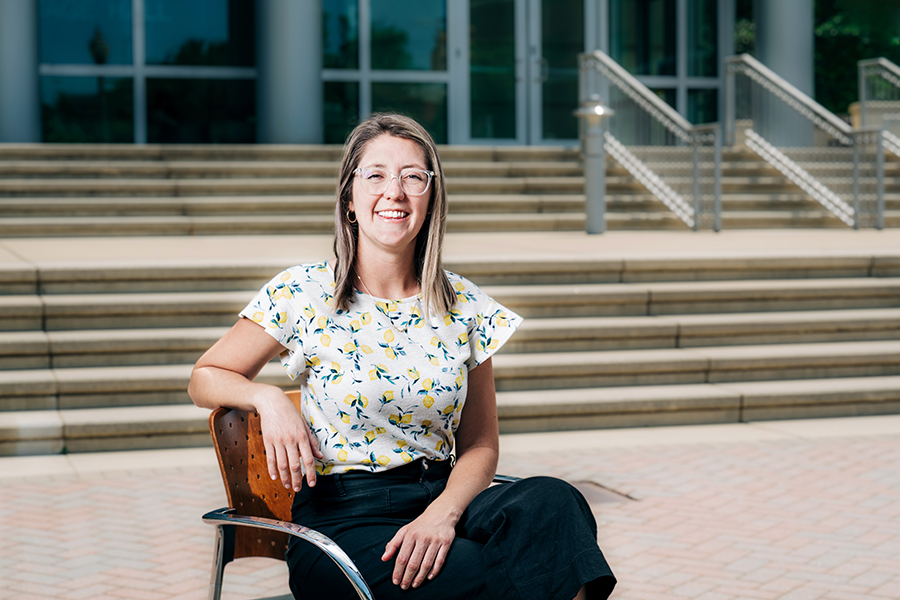 Tricia Phillips, Ph.D., developed Data Dive Into Birmingham as a City as Classroom course with her math department colleague, Keren Li, Ph.D. “I love to engage with the community and connect with collaborators across the city,” Phillips said.
Tricia Phillips, Ph.D., developed Data Dive Into Birmingham as a City as Classroom course with her math department colleague, Keren Li, Ph.D. “I love to engage with the community and connect with collaborators across the city,” Phillips said.
Photo by Andrea Mabry, UAB Marketing and CommunicationsOne of the signature elements of UAB’s Blazer Core Curriculum, launched in fall 2023, is City as Classroom. This group of courses, now more than 40 strong, is designed to engage students in their topics by working directly with local communities.
Chris Minnix, Ph.D., director of the Blazer Core Curriculum, has described City as Classroom courses as ones “that will lead students to majors, minors and even careers that they had never contemplated before, as well as inspire them to be engaged citizens.”
Some fields seem to lend themselves naturally to this approach. A course in the School of Nursing, Health in the City, focuses on the impact of urbanization on the physical and emotional well-being of vulnerable populations. An English class, Writing in Birmingham, emphasizes issues related to the city’s past and present, including the ethics and civic responsibilities of Birmingham residents.
Bringing the community into the classroom
But what can you do with math? That was the challenge facing Tricia Phillips, Ph.D., and Keren Li, Ph.D., both assistant professors in the Department of Mathematics. “It’s a little tricky,” Phillips said. “With history, you could go to a museum; with math, there is not a physical place we can go. That’s why we decided to bring the community into the classroom.”
Phillips participated in the Blazer Core Fellows program, as part of its 2023-2025 cohort. Blazer Core Fellows provides faculty with a two-year fellowship that supports innovative core teaching and course design.
The result is Data Dive Into Birmingham, developed by Phillips and Li and first co-taught by them in fall 2024. The course focuses on statistics and data science, with collaborators and guest speakers from local employers including Alabama Power and Protective Life, along with UAB representatives from the Department of History and the School of Public Health. The presenters explain how they use statistics and data science tools and topics in their daily work. As one example, the speaker from Alabama Power explained the multiple layers of protection that go into ethical data analysis. “I love to engage with the community and connect with collaborators across the city,” Phillips said. “The students benefit, and the companies we work with also get a chance to explain to students, ‘This is my cool job,’ which can help them with recruitment [into their field].”
Data that is relevant to students' lives
Some of these companies have also provided datasets for the students to work with and practice their skills, in addition to practice with publicly available datasets on population, economy, housing and more from the City of Birmingham, Phillips says. Datasets include voting exit polls in Birmingham, information on food insecurity and even results from UAB’s biannual Campus Engagement Survey of employees. In a final presentation, students use the skills they have learned in the course to analyze a dataset of their own choosing and present their findings to the class.
“Students are exposed to a variety of fields and careers, they work with local data that is relevant to their lives, and they also develop programming skills in the R language, which is widely used for statistics,” Phillips said. “This is an introductory course, so they don’t have to have any background in programming; but they take away data analysis skills, learn about ethical data practices and get experience communicating results.”
Phillips had “very positive feedback” on the course in fall 2024 and will be teaching it again in fall 2025, she said. “It gives students a chance to learn the basics of statistics in a context that is very relevant, and an opportunity to learn to program, which translates very well to other courses. I am a really interactive professor by nature, so the interactive, collaborative nature of this class was a very positive experience for me as well.”